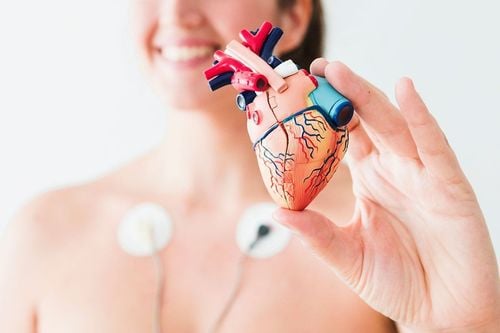Potassium in serum helps maintain homeostasis. Low (hypokalemia) or high potassium (hyperkalemia) can lead to threatening symptoms. Potassium ions are essential for muscle contraction. In patients with episodes of low blood potassium, muscles may cease to function voluntarily, resulting in paralysis. However, not all paralysis is due to periodic paralysis. The article below will clarify the symptoms of individuals with potassium deficiency.
1. What is potassium deficiency?
Potassium is an essential mineral for the body. It is contained within all body cells. Potassium ions in the blood control nerve function and heart rhythm. 98% of potassium within the body is found inside the cells. Potassium deficiency often occurs in patients who take diuretics. Additionally, the use of certain antibiotics, vomiting or diarrhea, excessive use of laxatives, eating disorders (such as binge eating), chronic kidney disease, excessive alcohol consumption, low magnesium levels, folate deficiency, and heavy sweating are also factors that can lead to low potassium levels.
Potassium plays a key role in vital functions:
- Maintaining electrolytes and water balance in the body: The body is made up of 60% water. 40% of the water is found inside cells - intracellular fluid (ICF). The remaining water is outside cells in the extracellular space and between cells. This fluid is also known as extracellular fluid (ECF). The balance between fluid inside and outside cells is necessary for maintaining cell shape. This is regulated by potassium and sodium. Potassium is the main electrolyte in the cells, while sodium is the main electrolyte in the extracellular fluid. An imbalance in electrolyte concentration can cause cells to shrink or swell, leading to rupture. This can result in organ damage.
- Maintaining the nervous and muscular system: The nervous system transmits messages between your brain and body through nerves. The function of nerves and muscles relies on potassium and calcium ions. In cases of potassium deficiency, the nerves innervate the limbs may not function, leading to paralysis-like symptoms.
- Regulating cardiac contraction mechanisms: The nervous system controls the contraction of muscles. Nerve signals are generated when sodium enters a cell while potassium exits the cell. Both low and high potassium concentrations can affect the nerve signals that generate an irregular heartbeat (arrhythmia), which can be life-threatening. The muscles of the intestines are also affected when potassium levels are low, causing bowel distension.
To know if you are potassium deficient, you can undergo regular blood tests. Normal potassium levels range from 3.5 to 5.0 mEq/L (mEq/L stands for milliequivalents per liter of blood and is a unit used to evaluate potassium levels). Low potassium is defined as levels below 3.5 mEq/L.
Individuals with serum potassium levels below 2.5 mmol/L must receive immediate care with medication. Those with eating disorders such as anorexia nervosa and binge eating, AIDS patients, alcoholics, and those who have undergone pelvic surgery have a higher risk of hypokalemia than others.
There are many symptoms of potassium deficiency; however, people often overlook this deficiency, leading to severe harm to the body and potentially life-threatening consequences.

2. 8 Symptoms of the Body When Deficient in Potassium
2.1. Muscle Weakness
The first symptom of potassium deficiency is its negative impact on muscles. It weakens the function of muscle cells and can also damage your muscles, leading to muscle stiffness and weakness, along with pain. Additionally, your body needs potassium to heal damaged muscle cells.
Therefore, if you feel that your muscles are becoming fatigued and weak without clear reason, you should immediately consult a doctor to test your potassium levels.
2.2. Tingling Sensation
One of the other common symptoms of potassium deficiency is a tingling sensation. Potassium is very important for nerve function. If your potassium levels are low, it can negatively impact the electrical impulses transmitted from your skin, moving through muscles and then into your spinal cord and brain. This causes your outer limbs to lose sensation, thereby resulting in a tingling feeling.
Generally, you often notice this sensation in your toes, fingers, feet, hands, legs, and arms. Additionally, low potassium levels can also contribute to muscle cramps.
Therefore, if you experience a tingling sensation in your legs or arms, along with some of the symptoms mentioned in this article, you may be at risk of potassium deficiency. In this case, a simple blood test is the best option to determine whether you have a potassium deficiency.
2.3. Emotional and Mental Issues
There are many symptoms of potassium deficiency, and experiencing emotional or mental issues is one of them. Potassium is a vital mineral for brain function and mental health. It can maintain nerve transmission and the electrical capacity of your brain. Furthermore, it is essential for the transport of serotonin, a neurotransmitter that promotes feelings of happiness. This is why potassium deficiency is a contributing factor to mood swings, confusion, delirium, hallucinations, and depression.
A paper published in 1992 indicated a connection between potassium, sodium, and magnesium in patients with depression. Moreover, another study in 2022 showed that hypokalemia could lead to depression.
2.4. High Blood Pressure
This is one of the eight most common symptoms of potassium deficiency that you should be aware of. In fact, potassium has the ability to dilate blood vessels, and if your body does not receive enough potassium, the blood vessels may constrict, causing high blood pressure. Additionally, potassium helps balance the negative effects caused by sodium. When the body lacks potassium, the sodium balance will also be disrupted, thereby impacting blood pressure. A recent study indicated that low potassium levels are as important as high sodium levels, especially in African Americans with high blood pressure. This study also pointed out the relationship between high blood pressure and low potassium levels.
Besides high sodium levels and low potassium levels, many other factors contribute to increased blood pressure. Therefore, it is best to consult a doctor for an accurate diagnosis of the underlying cause of this issue.
2.5. Constipation
You may experience several symptoms of potassium deficiency, including constipation. Potassium is not only crucial for your muscle health but also plays an important role in ensuring that the digestive system which is composed of smooth muscles that contract rhythmically and thus support digestion is well functioning. Therefore, if your body is deficient in potassium, it may disrupt the involuntary muscle functions of your intestines and stomach. When these muscles function well, it is very beneficial for digestion, metabolism, and absorption. Conversely, if their function is poor, it can lead to constipation. Along with constipation, you may experience symptoms such as cramps, pain, and bloating. Since constipation can be caused by various issues, you should talk to your doctor for an accurate evaluation.
2.6. Rapid Heartbeat
If you are experiencing any health issues related to the heart, it may indicate that you are deficient in potassium. This is also one of the common symptoms of potassium deficiency. This symptom can cause your heart to beat rapidly and erratically without any explanation.
Potassium deficiency can disrupt your heart's rhythm, which is the coordinated contraction of your heart controlled by electrical impulses. However, if your body has sufficient potassium, it will help protect your heart from strokes, heart attacks, and other heart diseases.
You should seek medical attention immediately if you frequently experience a rapid heartbeat.
2.7. Fatigue
Fatigue is generally one of the eight common symptoms of potassium deficiency. This type of fatigue is not due to overwork or exertion, and you may not be able to pinpoint the exact reason for it.
All cells in the body require an adequate amount of potassium to function properly, and a deficiency of this mineral can directly affect cellular function as well as organ functions. Thus, you may feel fatigued if you lack potassium.
If you are experiencing this condition, you will need to exert more effort to perform your daily activities. Since fatigue can be an early sign of underlying health issues, it is advisable to consult a doctor for an accurate diagnosis.

2.8. Muscle Cramps
The final symptom among the eight signs of potassium deficiency is frequently experiencing muscle cramps, especially in the legs, arms, and feet. In reality, potassium is an electrolyte present in all body cells, including nerve and muscle cells. It works with sodium to help control the electrical charge of cells, regulating muscle activity and contractions. When your body lacks this mineral, its cells cannot properly receive or send electrical signals to maintain muscle contraction activities. This will increase the risk of frequent muscle cramps, which can last from a few seconds to a few minutes.
Due to the fluid deficiency caused by sweating, potassium deficiency can occur, making it very important to replenish potassium in the body after exercising. If you experience frequent cramps, it is advisable to schedule an appointment with a doctor for treatment.
3. What should you do when your body shows signs of potassium deficiency?
The required potassium level for adults is about 45 millimoles (mmol) per kg of body weight. Our body needs about 3.5g of potassium every day, primarily obtained from food sources. Therefore, to increase potassium absorption, it's recommended to consume electrolyte drinks like salted water, coconut water, or orange juice. Rich sources of this mineral include:
- Vegetables and fruits: parsley, dried apricots, potatoes, bananas, bamboo shoots, papayas, apples, grapes, avocados, tomatoes, leafy greens, etc.
- Dairy products: fresh milk, yogurt.
- Fish such as: tuna, cod, etc.
- Legumes: lima beans, pinto beans, kidney beans, soybeans, black beans, lentils, and peas.
- Other foods include: brown rice and white rice; cereal bran; whole grain bread; meat from livestock and poultry; and various seeds.
- If you are accurately diagnosed with potassium deficiency, keep in mind some tips below to ensure your body receives enough potassium:
- Vegetables rich in beta-carotene also contain a high amount of potassium. Sweet potatoes, carrots, broccoli, spinach, red peppers, and Swiss chard are examples of vegetables high in beta-carotene.
- Gradually incorporate potassium-rich foods into your daily meals until your body has sufficient potassium. Avoid trying to replenish the deficient potassium in just one day.
- When your body lacks potassium, avoid strenuous physical activities as they may lead to potassium deficiency through sweating.
- Avoid excessive potassium supplementation, as it can also be harmful to your health, especially to your kidneys.
- Always consult your doctor before supplementing with any potassium supplements.
- Fish, such as salmon and sardines, are also rich in potassium.
- Natural fruits are the best solution to help your body obtain this mineral. Some potassium-rich fruits include avocados, bananas, oranges, strawberries, kiwis, mangoes, dates, and apricots.
Note: Only supplement with pills when there is a medical examination and a doctor's prescription.
Please dial HOTLINE for more information or register for an appointment HERE. Download MyVinmec app to make appointments faster and to manage your bookings easily.













